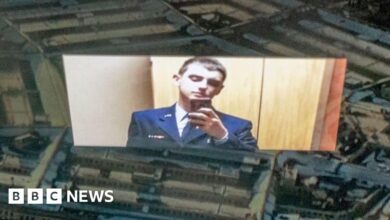Middle East crisis live: over 50,000 children could be living without parents in Gaza, warns International Rescue Committee
Up to 51,000 children in Gaza could be unaccompanied or separated from parents, charity warns
The International Rescue Committee (IRC) has shared a new report detailing the devastating impact Israel’s war on Gaza has had on the children in the territory.
Here are some of the main findings from the report:
-
About 17,000 children are estimated to be unaccompanied or separated from parents and caregivers. The IRC thinks this figure could be three times as high (51,000).
-
Frequent Israeli evacuation orders, detentions and attacks have contributed to more families being separated in Gaza over the past few months.
-
Some children have been found living alone in hospitals.
-
Unaccompanied and separated children face high risks of child labour, exploitation, neglect, starvation, and long-term mental health impacts.
-
Every child, parent and caregiver in Gaza is experiencing trauma.
-
IRC teams in Gaza are seeing increased rates of severe and acute malnutrition in children under five.
-
Children in Gaza have now missed one year of education because of the collapse of the education destruction of school buildings caused by Israeli bombardment.

Bart Witteveen, the IRC’s country director for the occupied Palestinian territory, said:
Children are bearing the brunt of this war, and it’s clear that without an immediate and lasting ceasefire in sight, the long-term impacts will only become greater. Prolonged toxic stress from violence and displacement can lead to long-term health challenges for children.
Without support through psychosocial activities or safe spaces for children, there is a significant risk of long-term developmental impacts, including on brain development. The international community must act immediately to safeguard children, not just in the immediate term, but also taking into account their long-term health needs, whether related to mental health, healthcare or education.
Children in Gaza cannot wait any longer, prolonged restrictions on humanitarian aid and continued fighting means that a generation of children will now experience life-long health and developmental issues.
Key events
Israel police say six people have been injured in ‘terrorist attack’ in city of Hadera
Israeli police said at least six people have been injured in a stabbing in four locations in the northern city of Hadera, describing it as a “terrorist attack”. We will bring you more details on this breaking news as we get it.
A police statement read:
The attack took place on four different sites where six people were stabbed… a short time ago, the police located the suspect and neutralised him by shooting.
In a statement, Israel’s Magen David Adom ambulance service said:
We treated several injured individuals in varying conditions, some of whom were in serious condition,” said emergency service provider Magen David Adom.
We provided life-saving medical treatment and began transporting them to Hillel Yaffe medical centre.
The attack comes more than a week after seven people were killed in a shooting and stabbing – which Hamas claimed responsibility for – in Tel Aviv, Israel’s commercial capital.
IDF footage of strikes on Gaza shows ‘unprecedented rates of civilian harm’ – investigation
Airwars, an investigative war monitor, has analysed hundreds of clips of Israeli strikes on Gaza released by the Israel Defense Forces (IDF) over the past year. The footage was geolocated and linked to incidents in which Palestinians had publicly reported that civilians were injured or killed.
The investigation, which was conducted in collaboration with Sky News’ data and forensics unit, identified 17 incidents from the first month of the war – which broke out last October – in which the footage released by the IDF corresponded with the location of where Airwars had documented civilians being harmed.
Just from these 17 clips, over 400 Palestinian civilians, including more than 200 children, were reported to have been killed, Airwars said. You can view the interactive map with strike footage here and watch a short film based on Airwar’s reviewing of the devastating impact from three specific strikes here.
Airwars says the footage in the short film shows how the IDF’s bombing campaign has caused “unprecedented rates of civilian harm”.
Commenting on the investigation, Emily Tripp, Airwars’ director, said:
The Israeli military has shared hundreds of videos of their own strikes on social media in Gaza – grainy black and white clips with few details but captions declaring they were striking Hamas targets. The message they wanted the world to see was one of a precise campaign, a controlled narrative of careful and calculated warfare.
But by locating these clips and matching them to civilian harm allegations we uncovered a different story. Even in the strikes the Israeli military itself published footage of – the ones it chose to show the world – we found hundreds of civilians killed. This is yet more evidence that the practices of the Israeli military are leading to unprecedented levels of civilian harm.
An Oxfam analysis, published last week, found that more women and children have been killed in Gaza by the Israeli military over the past year than the equivalent period of any other conflict over the past two decades. The charity cited “conservative figures” that estimated over 6,000 women and 11,000 children in Gaza had been killed by the Israeli military since last year. Gaza’s health ministry said earlier today that at least 42,010 Palestinian people have been killed and 97,720 injured in Israeli strikes on Gaza since 7 October 2023. Israel has denied targeting civilians in its war on Gaza.
The Palestinian civil emergency service said it had received unconfirmed reports that dozens of Palestinian people may have been killed in Jabalia and other areas of northern Gaza, but is unable reach them because of Israeli bombardments.
The Israeli army has surrounded Jabalia since Sunday, as well as other nearby neighbourhoods, ordering residents to flee southward, even though there is nowhere area completely safe for them to go.
Up to 51,000 children in Gaza could be unaccompanied or separated from parents, charity warns
The International Rescue Committee (IRC) has shared a new report detailing the devastating impact Israel’s war on Gaza has had on the children in the territory.
Here are some of the main findings from the report:
-
About 17,000 children are estimated to be unaccompanied or separated from parents and caregivers. The IRC thinks this figure could be three times as high (51,000).
-
Frequent Israeli evacuation orders, detentions and attacks have contributed to more families being separated in Gaza over the past few months.
-
Some children have been found living alone in hospitals.
-
Unaccompanied and separated children face high risks of child labour, exploitation, neglect, starvation, and long-term mental health impacts.
-
Every child, parent and caregiver in Gaza is experiencing trauma.
-
IRC teams in Gaza are seeing increased rates of severe and acute malnutrition in children under five.
-
Children in Gaza have now missed one year of education because of the collapse of the education destruction of school buildings caused by Israeli bombardment.
Bart Witteveen, the IRC’s country director for the occupied Palestinian territory, said:
Children are bearing the brunt of this war, and it’s clear that without an immediate and lasting ceasefire in sight, the long-term impacts will only become greater. Prolonged toxic stress from violence and displacement can lead to long-term health challenges for children.
Without support through psychosocial activities or safe spaces for children, there is a significant risk of long-term developmental impacts, including on brain development. The international community must act immediately to safeguard children, not just in the immediate term, but also taking into account their long-term health needs, whether related to mental health, healthcare or education.
Children in Gaza cannot wait any longer, prolonged restrictions on humanitarian aid and continued fighting means that a generation of children will now experience life-long health and developmental issues.
Death toll in Gaza reaches 42,010, says health ministry
At least 42,010 Palestinian people have been killed and 97,720 injured in Israeli strikes on Gaza since 7 October 2023, the Gaza health ministry said in a statement on Wednesday.
Of those, 45 Palestinians were killed and 130 injured in the latest 24-hour reporting period, according to the ministry, which has said in the past that thousands of other dead people are most likely lost in the rubble of the enclave.
One Syrian security personnel member was killed and another injured in an Israeli airstrike east of the southern city of Quneitra, Syria’s state news agency has reported. Israel has been carrying out airstrikes against Iran-linked targets in Syria for years but has intensified attacks since last October.
Leaders from Hamas, the Palestinian militant group, and Palestinian President Mahmoud Abbas’ Fatah movement will hold unity talks in Cairo today, a Hamas official has told Reuters.
“The meeting will discuss the Israeli aggression on the Gaza Strip, and the challenges facing the Palestinian cause,” Taher Al-Nono, the media adviser of the Hamas political chief, said.
The meeting will be the first in months since the two groups held talks in Beijing in July, when they agreed on steps to form a national unity government at an unspecified point in the future. Similar rounds in the past have so far failed to make progress. You can read more on the Beijing declaration from my colleague, Amy Hawkins, in this story.
Hamas and Fatah have been long time rivals. The split came in 2007 when Hamas became the sole ruler in Gaza after violently routing out Fatah from the territory. This was a year after Hamas won legislative elections. Since then, the Fatah-dominated Palestinian Authority (PA), led by Abbas, runs parts of the West Bank not under full Israeli control.
Western states support the idea of post-war Gaza being run by a reformed PA, which receives security assistance from the US and the EU.
Hamas, which is proscribed as a terrorist group by Israel, the UK and other countries, recognises it cannot be part of any internationally recognised new government of the Palestinian territories when Israel’s war on Gaza finally ends, a source has told Reuters.
But it reportedly wants Fatah to agree to a new technocratic administration for the West Bank and Gaza as part of a wider political deal.
Israel vowed it would not accept any role for Hamas in post-war Gaza. It says it doesn’t trust the Abbas-led Palestinian Authority to do it either.
The spokesperson of the Iranian foreign ministry has confirmed reports that Tehran’s foreign minister, Abbas Araghchi, will arrive in Saudi Arabia later today.
In a post on X, Esmaeil Baghaei said:
Following the diplomatic consultations of the Islamic Republic of Iran and coordination with the countries of the region to stop the genocide and aggression of the Israeli regime and reduce the suffering of our brothers and sisters in Gaza and Lebanon, Dr. Araghchi, the minister of foreign affairs, is leaving for Saudi Arabia today. Genocide and rape must stop.
Iran is determined to further strengthen relations with its neighbours, to ensure stability and security, as well as to develop economic cooperation in order to benefit all the nations of the region.
در ادامه رایزنیهای دیپلماتیک جمهوری اسلامی ایران و هماهنگی با کشورهای منطقه جهت توقف نسلکشی و تجاوزات رژیم اسراییل و کاهش درد و رنج برادران و خواهرانمان در #غزه و #لبنان، دکتر عراقچی وزیر امورخارجه، امروز عازم #عربستان سعودی میشوند.
نسل کشی و تجاوز باید متوقف شود.
ایران… pic.twitter.com/yzVxRhYn9P
— Esmaeil Baghaei (@IRIMFA_SPOX) October 9, 2024
Gulf states must not allow use of airspace against Iran – official
Tehran is still bracing for Israeli retaliation for Iran’s missile attack on the country last week. The strikes, which Iran said were aimed at military bases, were largely thwarted by Israel’s aerial defences with support from its western allies. Iran said the attack was launched in retaliation for Israel’s assassination of senior Hamas and Hezbollah leaders and Israel’s war on Gaza and assault on Lebanon.
Gulf Arab states have sought to reassure Iran of their neutrality in the escalating conflict between Tehran and Israel, according to reports. Gulf states include Saudi Arabia, which has expressed interest in normalising relations with Israel after the war in Gaza, the United Arab Emirates, Kuwait and Qatar.
A senior Iranian official has told Reuters that Tehran has told Gulf Arab states it would be “unacceptable” if they allowed use of their airspace or military bases against Iran and warned that any such move would draw a response.
The senior official, who wished to remain anonymous, told Reuters:
Iran made it clear that any action by a Persian Gulf country against Tehran, whether through the use of airspace or military bases, will be regarded by Tehran as an action taken by the entire group, and Tehran will respond accordingly.
The message emphasised the need for regional unity against Israel and the importance of securing stability.
“It also made clear that any assistance to Israel, such as allowing the use of a regional country’s airspace for actions against Iran, is unacceptable,” the official added.
It is not clear yet how Israel will respond to Tehran’s ballistic missile attack. The US president, Joe Biden, has cautioned against striking Iranian oil facilities (after he had suggested Washington was “discussing” such action). Some of the other targets Israel could try to strike are Iran’s cluster of missile and drone bases, its economic infrastructure or its oil terminals.
As we mentioned in an earlier post, Biden is expected to hold a telephone call later today with his Israeli counterpart, Benjamin Netanyahu, that will reportedly include discussion of any plans to strike Iran. Meanwhile, Iran’s foreign minister, Abbas Araqchi, is heading to Saudi Arabia and other Gulf states for talks later today.
Israeli forces launched a “raid” on the city of Sidon (or Saida), in southern Lebanon, killing one person and injuring several others, Lebanon’s state-run National News Agency reported earlier today. We will give you more details on this as they come in.




